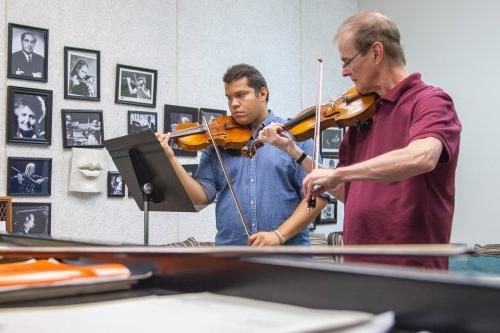Below are examples of ways to document professional activities. This list of examples is neither comprehensive nor mandatory.
TEACHING EFFECTIVENESS
Command of Subject: Course syllabi, incorporation of new developments in field, instructional innovation, activities to expand your knowledge or explore what others are doing, new-course development
Skill in Organizing and Presenting Material with Force and Logic: Course materials, course syllabi, organization of course resources (e.g. Blackboard), statement of personal assessment, changes made in response to student achievement or feedback, instructional innovation, exploration of new pedagogy
Intellectual Integrity: Approach to rigor, documentation of your expectations of students, methods of assessing student learning in your classes
Enthusiasm for Learning Within and Outside of Classroom: Statement of personal assessment, instructional innovation, evidence that students are responding to subject matter (e.g. student feedback), examples of student work, community engagement, student mentorship experiences
Ability to Motivate Students to Intellectual Curiosity: Statement of personal assessment; approaches to pedagogy; instructional activities; student feedback; examples of student work; experimentation with service learning, online learning, or other pedagogies; undergraduate research
Measures of Actual Teaching Performance, including:
Feedback from chair
Feedback from faculty peers in classroom observations – very important
Feedback from dean, if any
Student evaluations, including sample data from student evaluations (not every course every semester); sample of written comments, if any
PROFESSIONAL COMPETENCE
Research, Publication, Grants or Creativity and Performance in the Fine Arts
Anti-chronological listing in CV; copies or representations of products; explanation of your role in collaborative projects; engaged scholarship; awards; feedback from reviewers; letters from colleagues and external partners; co-authored products with students
Leadership and Service to College, including:
Responsibility and creativity in departmental affairs: Committees, terms of appointment, your role; samples of creative contributions; learning-outcomes assessment, accreditation, faculty development; contributions to and innovations in instructional program;
Service on college committees: Committees, terms of appointment, your role; samples of creative contributions; contributions to learning-outcomes assessment, accreditation, faculty development; FCTL sessions or workshops led
Quality of student advising: Advising load, statement of approach to advising in personal assessment, activities undertaken to prepare for advising; include informal and student-group advising and research mentorship
Professional Improvement, such as:
Faculty development programs: Listing of activities including FCTL programs, conferences, workshops
Graduate courses: Listing on CV; Attendance at professional meetings; Listing on CV; indicate role
Offices in professional organizations: Listing on CV; indicate role
Leadership and Service to Community, State, or Nation: Listing of activities in CV, statement of contributions, community or industry partnerships, media contacts made (if any)



